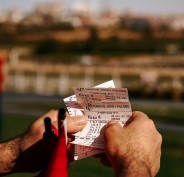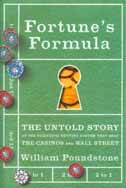
Fortune's Formula, The Untold Story of the Scientific Betting System That Beat the Casinos and Wall Street
The Calm Gambler: How Emotional Control Separates Casual Players from Consistent Winners
Every spin, every goal, every wager begins the same way, with a heartbeat. The calm gambler learns to steady it, knowing self-control is really the invisible line between luck and discipline. Winning There are occasions when we here at ReadyBetGo want to bring you interesting facts about the gambling industry When something catches our eye, we will publish it for your enjoyment.
There are occasions when we here at ReadyBetGo want to bring you interesting facts about the gambling industry When something catches our eye, we will publish it for your enjoyment. 
becomes less about odds and more about keeping your balance when things move quickly.
Betting is really unpredictable, and that’s what makes it addictive. But in every high-pressure moment, the player who can manage emotion has the edge. The difference between chaos and clarity isn’t chance, it’s composure.
The Real Battle Happens Inside
The rush of a live game can really feel electric. The noise, the anticipation, the instant decisions, they all feed your senses. Yet that same energy can throw you off course. When emotion takes the lead, rational thought slips into the background and choices chase excitement instead of opportunity. The composed player learns to sense that tension and redirect it into focus rather than impulse.
You can’t really control outcomes, but you can control your rhythm. That means pausing before the next wager, waiting for your pulse to drop before reacting to a loss and refusing to play from frustration. That pause turns instinct into awareness and reaction into decision.
True patience doesn’t mean inaction. It’s an active skill that really keeps your thoughts clear while everyone else rushes. Betting isn’t about suppressing emotion but using it as a guide toward better timing.
What Experience Teaches That Excitement Can’t
Excitement may ignite a huge flame, but experience holds it steady. When you’ve really been around long enough, you realize that feeling a certain way about your sport, the peaks after a victory, the lows after a loss is just a purely misleading momentum.
Observation of patterns reveals that judgment changes with fatigue, that confidence overreaches after a period of luck and that frustration cuts shots short. This really helps to create a gap between feeling and doing. With time, it will be noted that consistency, not confidence, measures success.
A steady player does not deny any of their feelings, since they extract information from it, knowing that narrowing perspective by energy leads to its recovery via reflection. This transforms gambling itself into a reflective endeavor, where understanding oneself means as much as succeeding.
Betting in the Fast Lane
Modern betting moves faster than ever. Live markets shift by the second, tempting snap reactions. On platforms like Betway, odds flicker and refresh constantly, testing your patience. The urge to act immediately feels natural, but those who stay grounded know that stillness is the sharper move.
The art isn’t speed, it’s timing. The more the market spins, the calmer you think. Composure becomes rhythm; quickness becomes accuracy. When others panic and chase shifting lines, you let the moment breathe. While the crowd follows emotion, you look for value beneath the noise.
Every second counts, but not every second deserves a move. The balanced player acts with intention rather than impulse. In a world built on instant options, patience becomes precision.
Turning Emotion into Awareness
Control is not a matter of masking your emotions but sensing yourself realistically. Frustration translates to fatigue, while excitement connotes overconfidence. Familiarity with these emotions is what distinguishes control from chaos. The player who hears early makes better moves later on.
When your body goes into flight mode from a near outcome, that’s the sign for you to breathe rather than looking for a comeback. After a victory, during the adrenaline high that’s equivalent to a license to pursue more, it’s time to pause for review. The trigger in each emotional high is feedback, never guidance. You’ll understand it as a compass indicating where your discipline is weak.
With time, it becomes a strategy. It’s no longer a matter of resisting the feeling but rather living with it. Passions drive focus; composure channels it. The experienced player doesn’t eliminate the emotion; they define it.
Building Your Own Calm
Composure isn’t talent, it’s training built over time. The more you practice awareness, the more automatic it becomes. You begin recognising shifts before they grow into mistakes. Fatigue, distraction and excitement become familiar landmarks on your mental map rather than traps.
Calm begins before the first bet. You set boundaries that hold when emotions rise. You define timing, reasons and intent and you stick to them. With repetition, those boundaries turn into instinct. Your focus becomes habitual, not forced.
The reflective bettor treats every wager as feedback. Each result, good or bad, reveals how well control held under pressure. Losses become lessons, wins become checkpoints. What’s left is rhythm: steady, deliberate and confident.
A Quiet Edge
Calmness in the long run is neither caution nor preparation; it’s readiness. It is an alert mind even in critical situations, making sound judgments even in changing odds. The disciplined player experiences the same level of adrenaline that other players feel, but they directs it in a controlled manner.
The real contest isn’t with the bookmaker or the market, it’s with your own impulses. Emotional steadiness becomes your greatest advantage, the one element entirely within reach. Whether browsing odds on Betway or reflecting on your last game, you realise composure isn’t passive, it’s power.
People who understand it cease to bet on emotion and instead bet on understanding. The quiet edge doesn’t scream, doesn’t cheer, it perseveres. And in the game of time, order always follows disorder.
